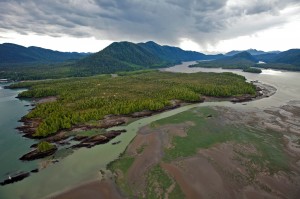First Nations groups in British Columbia have expressed outrage at proposals to transform an island into a liquefied natural gas terminal, citing a gross infringement of aboriginal rights.
First Nation groups in British Columbia (Canada) have united to condemn plans to transform vast swathes of the Skeena Watershed (near Prince Rupert) into a huge liquefied natural gas (LNG) field known as the Pacific NorthWest LNG Project. The controversial plans involve constructing an LNG export terminal on the 219 hectare-large Lelu Island.
The project, proposed by Malaysian state-owned energy company Petronas, is an attempt to tap into the burgeoning Asian market, where demand for energy currently outstrips the domestic need by a huge margin and where the rate of growth is amongst the fastest in the world, already expanding by two and a half times since 1990 according to the Southeast Asia Energy Outlook.
If successful, it is estimated that the Pacific NorthWest LNG Project could source as much as 12.8 million tons of LNG per annum, the revenues of which will go toward establishing a “CAD 100 billion prosperity fund.” Furthermore, an estimated 330 long-term careers will be generated through facility operations, as well as a further 4,500 jobs during the project’s construction.
Yet whilst the prospect of a wave of regional investment has been welcomed by certain parts of the community, just as many residents of Port Lewis and its surroundings are incensed at the idea of carving up the British Columbian countryside to create a LNG field. First Nation groups in particular are unhappy about the proposal, citing a lack of consultation and a gross infringement of aboriginal rights.
On the eve of Shamsul Azhar Abbas’, the Chief Executive Officer of Petronas, trip to Vancouver for a series of crucial meetings with the B.C. Premier Christy Clark and Natural Gas Development Minister, Rich Coleman, representatives of First Nation groups could be found taking to the streets in a passionate protest which saw them hold up signs on the frozen highway expressing outrage about “the approval of new infrastructure without adequate consultation.”
The First Nation groups are concerned that the LNG project poses a grave threat to their Aboriginal fishing rights, a ruling entrenched in Canadian law which ensures that First Nations have the right to fish. The ruling is certainly not insignificant in the Skeena Watershed context. Indeed, as Shannon McPhail, of the Skeena Watershed Conservation Coalition, explains, the Skeena River is the most productive salmon bearing river in B.C., serving as a nursery for juvenile fish and providing First Nations with food long before the European colonies arrived.
The 219-hectare large Lelu Island, with its estuary location, is particularly significant for the First Nations, continued McPhail. “You could not choose a worse location when it comes to wild salmon and steelhead. After hatching in the tributaries of these iconic, world-famous river systems in the Skeena watershed, 90 per cent of [the juvenile fish] have to go around Lelu Island before entering saltwater. [The Pacific NorthWest LNG project] would absolutely be a tipping point for the salmon in the estuary. You cannot put a terminal here.”
And as well as the potentially critical damage to salmon habitat, the question of entitlement also remains unanswered by the backers of the Pacific NorthWest LNG project. As Jessica Clogg (of West Coast Environmental Law) explained, the matter is very much a title question – even if the courts and the Crown have thus far failed to address it as such. “It is a title question insofar that an Aboriginal title includes the right to choose the uses to which the land is put. The Crown has an obligation to deal honorably with First Nations regardless of whether the court has recognized this fact.”
President and Chief Negotiator for the Gitanyow First Nation Chief Malii or Glen Williams added: “When British Columbia, the Prince Rupert Port Authority and Petronas sited a massive LNG development on the Skeena River’s most critical salmon habitat; they created the legal obligation to consult and accommodate First Nations who have an interest in Skeena salmon. Anything [the crown does] in these sensitive areas needs to be vetted through our chiefs.”
Yet according to Jessica Clogg at least (speaking via Planet Save.com) there have been no such attempts at a bilateral consultation thus far. “Consultation is more than just having a set of meetings or giving First Nations a chance to comment,” she said. “The Crown also has an obligation to change its planned course of action to accommodate Aboriginal title and rights if necessary. In this case the record demonstrates that serious concerns about impacts on salmon raised by First Nations have not been fully addressed.”
“Secondly, the Crown has in fact refused to include First Nations upstream on the Skeena in even the limited consultations there have been,” she continued. “This ignores the fact that impacts on juvenile salmon in the estuary will be felt throughout the ecosystem and the life cycle of the salmon and in my view is inconsistent with the Crown’s constitutional obligations.”
A final decision regarding the Pacific NorthWest LNG project is imminent. Keep an eye on Private Island News and Planet Save for the latest developments on this intriguing, controversial case, or have your say on the Private Island News social media pages. You’ll find us on Facebook, Twitter and Google+.



